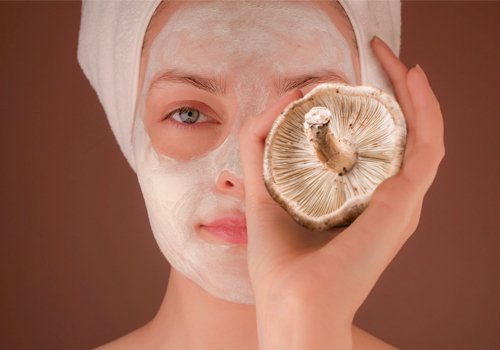Mushroom Benefits for Skin:
Mushrooms offer a range of benefits for skin health due to their rich array of bioactive compounds, including vitamins, minerals, antioxidants, and polysaccharides.
Here are some ways mushrooms can contribute to healthy, radiant skin:
1. Anti-Aging Properties:
Mushrooms are rich in antioxidants such as selenium, vitamin C, and ergothioneine, which help neutralize free radicals and reduce oxidative stress on the skin. This antioxidant activity can help protect skin cells from damage caused by environmental factors like UV radiation and pollution, potentially reducing the appearance of fine lines, wrinkles, and age spots.
2. Hydration and Moisture Retention:
Certain mushrooms contain polysaccharides like beta-glucans, which have humectant properties that attract and retain moisture in the skin. By enhancing skin hydration, mushrooms can help improve skin elasticity, softness, and overall moisture balance. This is particularly beneficial for individuals with dry or dehydrated skin.
3. Anti-Inflammatory Effects:
Mushrooms contain compounds like beta-glucans and triterpenoids that have anti-inflammatory properties. These compounds can help calm inflammation, soothe irritated skin, and alleviate conditions such as redness, itching, and dermatitis. Incorporating mushrooms into skincare formulations may help reduce skin sensitivity and promote a more balanced complexion.
4. Brightening and Even Skin Tone:
Some mushrooms, such as shiitake and maitake, contain compounds that inhibit melanin production and promote skin brightening. These mushrooms may help fade hyperpigmentation, dark spots, and uneven skin tone, leading to a more luminous and uniform complexion. Additionally, mushrooms rich in vitamin C can help stimulate collagen synthesis, improving skin texture and radiance.
5. Wound Healing and Repair:
Certain mushrooms have been traditionally used for their wound-healing properties. Compounds found in mushrooms, such as polysaccharides and peptides, have been shown to accelerate the healing process, promote tissue regeneration, and reduce scarring. Incorporating mushroom extracts into skincare products may support skin repair after injuries, surgeries, or inflammatory conditions.
6. Anti-Microbial and Anti-Acne:
Mushrooms exhibit antimicrobial properties that can help combat acne-causing bacteria and fungi on the skin. Additionally, mushrooms containing natural salicylic acid, such as the wood ear mushroom (Auricularia auricula-judae), may help unclog pores, reduce excess oil production, and prevent acne breakouts. These mushrooms offer a natural alternative for individuals seeking acne treatment without harsh chemicals.
7. Soothing and Calming Sensitivity:
Mushrooms with anti-inflammatory and soothing properties can help alleviate skin sensitivity and discomfort associated with conditions like rosacea, eczema, and psoriasis. By reducing redness, itchiness, and inflammation, mushrooms promote a more comfortable and balanced skin barrier, supporting overall skin health.
Incorporating mushrooms into skincare routines through topical formulations or dietary supplements may offer a holistic approach to maintaining healthy, radiant skin. However, it's essential to choose products from reputable brands and consult with a dermatologist if you have specific skin concerns or sensitivities.

Comments
Post a Comment